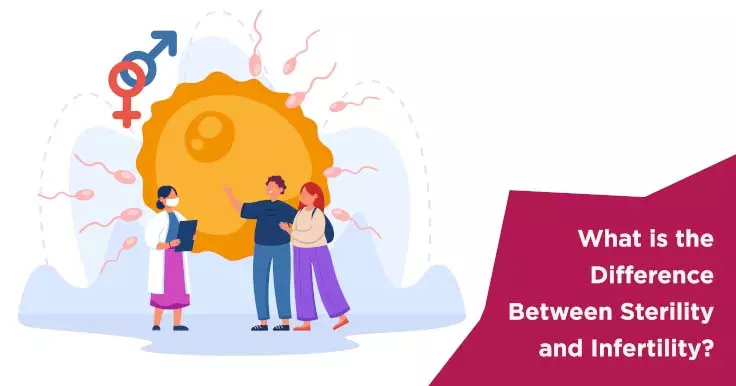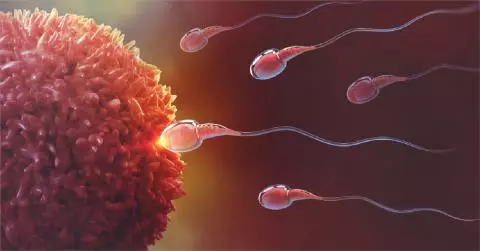Infertility And Sterility: Understanding the Differences, Myths, and Treatment Options

Infertility and sterility are terms that are often used synonymously, but in reality, there is a difference between sterility and infertility. Did you know that most people who consider themselves to be sterile are actually only infertile?
Let us clarify the two terms by explaining the key differences between them. The confusion in understanding the two terms has popularised a number of myths as well. Keep reading to learn what is the difference between sterility and infertility in males and females.
What Is Infertility?
A man or woman can be diagnosed with infertility if they are unable to conceive a child naturally despite having planned, unprotected sexual intercourse for over a year for people aged below 35. If you are aged over 35 and cannot conceive within six months of regular unprotected sexual intercourse, you are experiencing infertility.
Infertility can be caused by many factors, such as conditions like endometriosis, thyroid disease, or uterine fibroids in women and poor quality or quantity of sperm in ejaculate for men.
Depending on the factors triggering it, infertility may be treated with medication, hormonal therapy, or surgery. In cases of unexplained infertility, IVF is often the best option.
Myths and Facts About Infertility
Here are some common myths and facts about infertility:
Myth: Infertility is rare
Fact: Infertility is quite common, but many cases go undiagnosed because people assume themselves to be sterile and do not consult a doctor.
Myth: CCouples who have had one child do not need to be worried about infertility when conceiving a second child.
Fact: 30% of couples diagnosed with infertility already have a child. Thus, even if a couple already has one or more children, they may still be diagnosed with infertility.
Myth: Age only affects women’s fertility
Fact: Age affects fertility in both men and women. After the age of 30 years, as a woman grows older, the number of viable eggs reduces. Similarly, as a man grows older, after the age of 40 years, semen volume decreases.
What Is Sterility?
Not being able to conceive a child is the most common symptom of sterility. A person is said to be sterile if they are physically incapable of ever having a child, even with medical intervention. In the case of men, this may refer to an absence of sperm in semen and the case of women, this may refer to the nonexistence of ovulation. Sterility may occur because of birth defects, such as being born without ovaries or with underdeveloped testicles.
A person can also experience symptoms of sterility if they have undergone birth control surgical procedures such as tubal ligature for women or vasectomy for men. Sterility can occur in men after their testicles are removed due to cancer, for example. The removal of the uterus and ovaries (radical hysterectomy) also leads to sterility in women.
Myths and Facts About Sterility
Sterility is also a commonly misused word; here are some facts and myths about sterility:
Myth: Male infertility is known as sterility
Fact: Both men and women can be diagnosed as sterile.
Myth: Sterility is as common as infertility
Fact: Roughly 1 in every 6 people (about 17.5% of the adult population) in the world experience infertility. Whereas only a portion of the people with infertility may have sterility. Thus, infertility is more common than sterility.
Myth: Men who have no sperm in their semen can never father children
Fact: This is not always true. If the absence of sperm in semen is caused by a blockage, a doctor may be able to harvest sperm directly from the testes and use the same to fertilise an egg via IVF.
Key Difference Between Sterility and Infertility
Sterility and infertility should not be used interchangeably as they mean different things.
Infertility vs Sterility
| Infertility is characterised by a reduction in the ability to conceive a child and have a healthy pregnancy or lack of it. | Sterility is characterised by the inability to conceive a child. |
| Infertility can be temporary or permanent. | Sterility is permanent unless a person chooses to go through birth control procedures like vasectomy and tubal litigation. |
| Infertility can be caused by various factors, including hormonal imbalance, medical conditions, or low sperm count. | Sterility can be caused by congenital abnormalities, infections, surgical removal of reproductive organs, or blockage of fallopian tubes. |
Another key difference between sterility and infertility is that infertility can be caused by unexplained factors, whereas sterility is always the result of a medical condition, birth or congenital defect, or a medical procedure.
How to Treat Sterility and Infertility?
You may have gathered by now that sterility cannot be treated. However, the temporary hold on the reproductive abilities of a person with the help of birth control surgical procedures can be reversed to help them build a family. Additionally, a female who has sterility but has a functional uterus can use donor eggs to conceive through IVF and have a child. Similarly, if a man has sterility, he can use donor sperm to have a child with his partner through IVF. In case both male and female partners have sterility, they can also opt for IVF with donor embryos and a surrogate or adopt a child.
On the other hand, infertility is quite common and can usually be treated with medical intervention. A combination of medicines, diet and lifestyle changes, and surgery may be used to treat infertility in men and women, depending on the cause. One of the most common treatments for infertility is in vitro fertilisation (IVF)—a type of assisted reproductive technology (ART).
Conclusion
Although sterility and infertility both affect a person’s ability to have children, there are significant differences between the two terms. However, you don’t need to feel disheartened if you have any of the two, as the advancement in reproductive medicine during the past couple of decades has made it possible for people with sterility (in some cases) and infertility to conceive.
At Nova IVF Fertility, we understand the emotional toll infertility or sterility can take on a family. We also have the right tools and adequate knowledge to help people achieve their dream of becoming parents. Book your consultation with our fertility specialists today.
 Infertility Counselling
Infertility Counselling Female Infertility Treatment
Female Infertility Treatment Andrology Treatment
Andrology Treatment Fertility Enhancing Surgeries - Female
Fertility Enhancing Surgeries - Female Fertility Enhancing Surgeries - Male
Fertility Enhancing Surgeries - Male Endoscopy Treatment
Endoscopy Treatment IUI Treatment
IUI Treatment IVF Treatment
IVF Treatment ICSI Treatment
ICSI Treatment Advanced IVF Solutions
Advanced IVF Solutions Embryology
Embryology Vitrification Egg, Embryo, Sperm Freezing
Vitrification Egg, Embryo, Sperm Freezing Preimplantation Genetic Testing (PGT)
Preimplantation Genetic Testing (PGT) Donation Program Embryo / Egg / Sperm
Donation Program Embryo / Egg / Sperm Self-cycleTM IVF
Self-cycleTM IVF

 Self-cycleTM IVF
Self-cycleTM IVF










